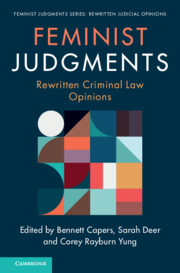Book contents
- Feminist Judgments: Rewritten Criminal Law Opinions
- Feminist Judgments Series
- Advisory Panel for Feminist Judgments Series
- Feminist Judgments: Rewritten Criminal Law Opinions
- Copyright page
- Contents
- Advisory Panel for Feminist Judgments: Rewritten Criminal Law Opinions
- Notes on Contributors
- Introduction and Overview
- Part I Gendered Justice
- Part II Gender on Trial
- 9 Commentary on State v. Williams
- 10 Commentary on State v. Walden
- 11 Commentary on State v. Norman
- 12 Commentary on Whitner v. State
- 13 Commentary on United States v. Nwoye
- 14 Commentary on Erotic Services Provider Legal Education and Research Project v. Gascon
12 - Commentary on Whitner v. State
from Part II - Gender on Trial
Published online by Cambridge University Press: 01 December 2022
- Feminist Judgments: Rewritten Criminal Law Opinions
- Feminist Judgments Series
- Advisory Panel for Feminist Judgments Series
- Feminist Judgments: Rewritten Criminal Law Opinions
- Copyright page
- Contents
- Advisory Panel for Feminist Judgments: Rewritten Criminal Law Opinions
- Notes on Contributors
- Introduction and Overview
- Part I Gendered Justice
- Part II Gender on Trial
- 9 Commentary on State v. Williams
- 10 Commentary on State v. Walden
- 11 Commentary on State v. Norman
- 12 Commentary on Whitner v. State
- 13 Commentary on United States v. Nwoye
- 14 Commentary on Erotic Services Provider Legal Education and Research Project v. Gascon
Summary
The decision of the Supreme Court of Massachusetts concerned the difficult problem of defining the quantum of intoxication abrogates a person’s ability to consent to sex. The jury convicted a police officer, who was summoned to assist a highly intoxicated person, of rape of that person. However, the high court overturned the conviction, holding that the “wholly insensible” test was too vague to support a legal conviction. Notably, the court offered no alternative to the rejected test, essentially leaving the state without any rule about the degree of intoxication or other incapacitation abrogates consent.
- Type
- Chapter
- Information
- Feminist Judgments: Rewritten Criminal Law Opinions , pp. 253 - 262Publisher: Cambridge University PressPrint publication year: 2022

